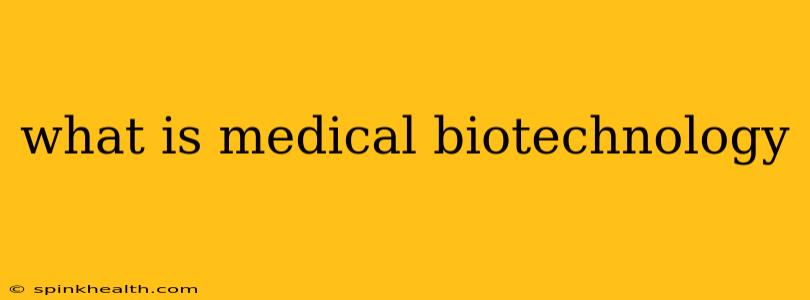Imagine a world where diseases are diagnosed earlier, treatments are more precise, and cures are within reach. This isn't science fiction; it's the promise of medical biotechnology. It's a field bursting with innovation, where the life sciences meet cutting-edge technology to revolutionize healthcare. But what exactly is medical biotechnology? Let's dive in.
At its core, medical biotechnology uses biological systems, living organisms, or derivatives thereof to develop or make improvements to therapeutic, diagnostic, and even preventative techniques and products. It's a vast and interdisciplinary field, drawing upon biology, chemistry, engineering, and medicine to solve complex health challenges. Think of it as a bridge connecting the fundamental understanding of life with the practical application of that knowledge to improve human health.
The Pillars of Medical Biotechnology: What Makes it Tick?
Several key areas define the scope of medical biotechnology:
1. Pharmaceutical Biotechnology: This is perhaps the most widely known aspect, focusing on the development of new drugs and therapies. Think genetically engineered insulin for diabetics, monoclonal antibodies targeting specific cancer cells, or gene therapies aiming to correct genetic defects. The process involves intricate techniques like recombinant DNA technology, cell culture, and protein engineering.
2. Diagnostic Biotechnology: This area centers around developing faster, more accurate, and less invasive diagnostic tools. From advanced imaging techniques like MRI and PET scans to innovative blood tests capable of detecting diseases at their earliest stages, diagnostic biotechnology plays a crucial role in early intervention and improved patient outcomes. Think rapid COVID-19 tests, or sophisticated genetic screening for predispositions to certain diseases.
3. Regenerative Medicine: This exciting field uses the body's own healing capabilities to repair damaged tissues and organs. Stem cell therapy, tissue engineering, and 3D bioprinting are some of the key techniques employed. Imagine replacing damaged cartilage with lab-grown tissue, or repairing spinal cord injuries with the help of stem cells.
4. Agricultural Biotechnology: While not strictly medical, agricultural biotechnology plays a significant role in improving the nutritional value of crops, thereby reducing malnutrition-related health problems globally. This includes genetically modifying crops to enhance their vitamin or mineral content.
Frequently Asked Questions about Medical Biotechnology
Here are some common questions people ask about medical biotechnology, explored in detail:
What are the benefits of medical biotechnology?
The benefits are transformative and far-reaching. Medical biotechnology leads to earlier disease detection, more effective treatments, personalized medicine tailored to individual genetic profiles, improved diagnostics leading to faster and more accurate diagnoses, the development of novel therapies for previously incurable diseases, and ultimately, a higher quality of life and longer lifespans for millions.
What are some ethical considerations in medical biotechnology?
The rapid advancement of biotechnology raises important ethical considerations. Questions surrounding gene editing, genetic screening, access to expensive treatments, and the potential for misuse of technology need careful and ongoing ethical debate. Transparency and responsible development are paramount to ensure these powerful tools are used for the benefit of humanity.
What is the future of medical biotechnology?
The future is brimming with possibilities. We can expect to see further advancements in personalized medicine, gene editing therapies for genetic diseases, and the development of even more sophisticated diagnostic tools. Artificial intelligence and machine learning are also poised to play a major role in drug discovery and development, accelerating the pace of innovation.
How does medical biotechnology differ from traditional medicine?
Traditional medicine often relies on established methods and treatments. Medical biotechnology, on the other hand, utilizes advanced technologies and scientific understanding at the molecular and cellular levels to develop innovative diagnostic tools, therapies, and preventive measures. It is a more precise and personalized approach.
In conclusion, medical biotechnology is a dynamic and rapidly evolving field with the potential to reshape healthcare as we know it. While challenges remain, the ongoing innovations in this field hold incredible promise for a healthier and longer future for all.

